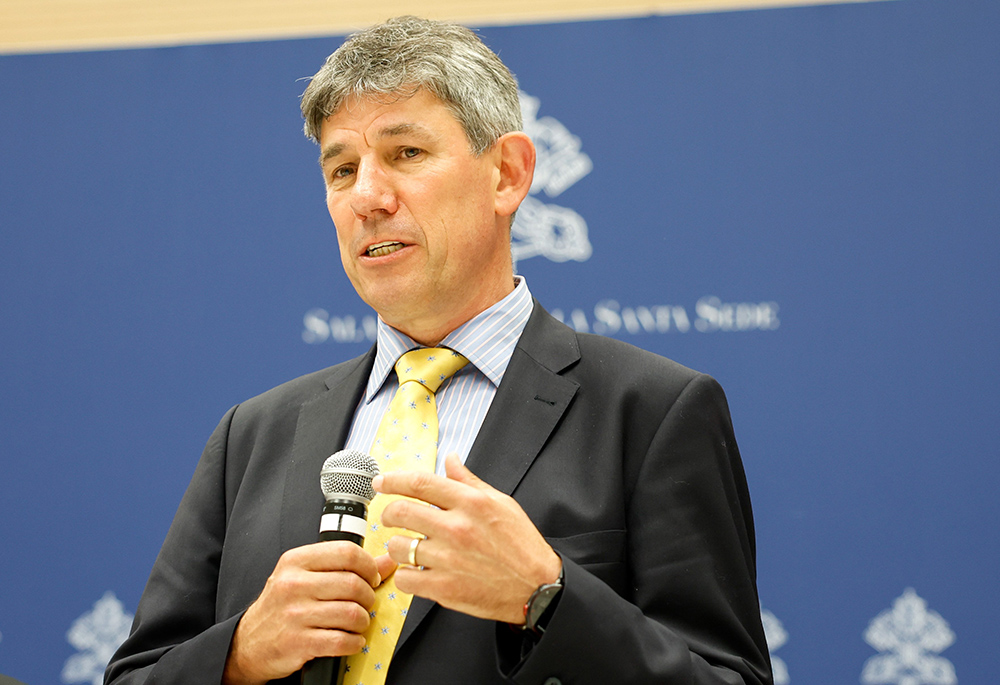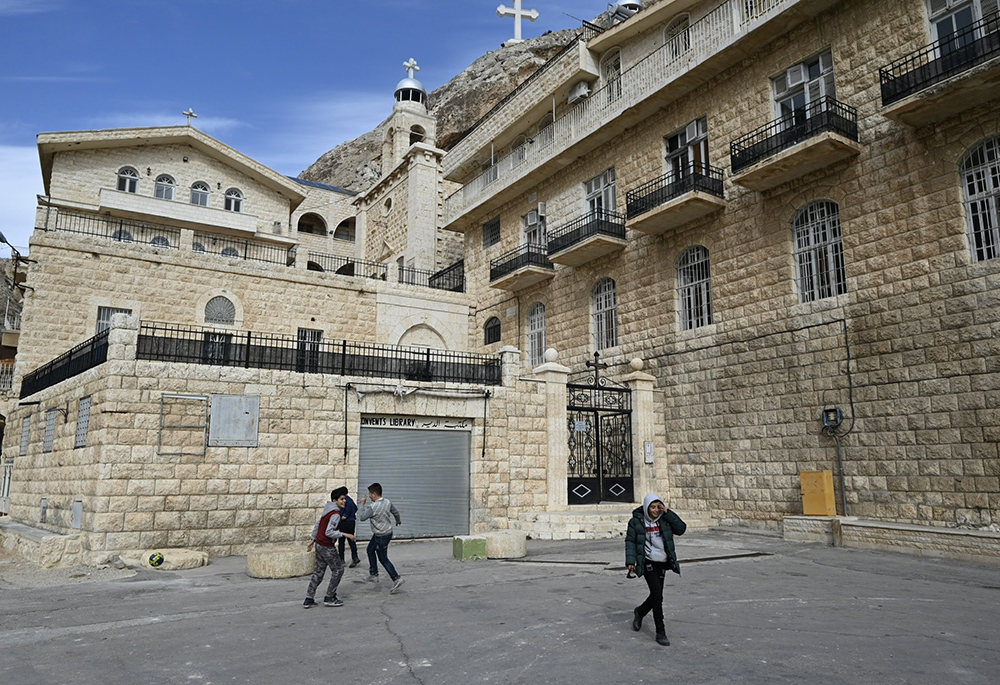
Alistair Dutton, then-new secretary-general of Caritas Internationalis, speaks to reporters during a news conference at the Vatican press office May 16, 2023. (CNS/Lola Gomez)
For Syria's post-regime change future to be successful, the head of the Catholic Church's leading humanitarian and social service confederation has one clear message: End the sanctions now.
"Syrians are highly competent, highly educated people who have had their legs cut off from under them through these sanctions," said Alistair Dutton, the secretary-general of Caritas Internationalis.
Dutton traveled to Syria from Jan. 28-30 and was one of the first high-profile global Catholic leaders to visit the country following the December 2024 fall of the brutal Assad family, which ruled the country with an iron first for over 50 years.
Since the country's 2011 civil war, Syria has been subject to a bevy of international economic sanctions, especially from the European Union and the United States in response to the Assad regime's ruthless human rights abuses.
For Dutton, however, these sanctions have always been ill-advised.
"The real crime and problem with the sanctions is that they don't hurt people in power," he told the National Catholic Reporter Jan. 31. "Assad was never hurt by the sanctions. It's people in the street. It's ordinary people who are hurt most by these sanctions."

Children play in a square in the Christian town of Maaloula, Syria, on Jan. 4. (OSV News/Leo Morawiecki)
Last month's surprise takeover of the country by an Islamist militant group and allied rebel factions has ushered in a new era of uncertainty for the country — one that brings with it many questions about what it means for the stability of the region, treatment of minorities and much more.
And despite the leadership's checkered past, Syria's caretaker government has pledged a more inclusive society and the opportunity for free and fair elections to share the country's future.
Dutton told NCR that he has frequently visited the country since the start of the civil war, including most recently in January 2024, but that he was eager to return to assess where it stands following the new regime's takeover.
"My main message coming back — it was true beforehand but now we have the change of regime — there's no excuse anymore for the sanctions that are in place," Dutton said. "They are crippling the whole country and making it impossible for people to rebuild their houses, whether they were destroyed in the war or in the earthquake."
Caritas Syria has been working in the country since 1954. And throughout the civil war, the organization has been one of the leading providers of humanitarian aid in the region. Their relief efforts — already strained by violence, poverty, hunger and low unemployment — were even more in demand following the February 2023 earthquake that killed over 5,000 and displaced thousands more.
Advertisement
During his visit, Dutton traveled to both Damascus and Aleppo, where he met with the country's local Caritas team, civic and religious leaders and United Nations personnel.
In his conversations with some of the country's critical stakeholders, he said there was a widespread consensus that the international sanctions that had been put into place to punish the Assad regime had "locked" the country in stasis.
"That regime is no longer in place," said Dutton. "Either the sanctions get dropped or it will start to look as if the sanctions are against the Syrian people per se, irrespective of who's in power or not."
In recent weeks, the European Union has taken tentative steps to begin to relieve sanctions. But while the U.S. has eased some restrictions on the country, it has kept economic sanctions in place and President Donald Trump's efforts to freeze foreign aid could have far reaching consequences for Syria.
After flying into Beirut and driving through Lebanon to the Syrian border, Dutton said he was surprised that the atmosphere in the country was "much, much lighter and freer than I'd seen it under the Assad regime."
While Syrian rebels managed to topple the Assad regime in a lightning fast military offensive, their unexpected rise to power meant they were without a clear plan on how to govern the country.
Upon arriving in the country, Dutton said that there were no military uniforms and that most officials at checkpoints and border crossings were armed but wearing civilian clothes.
"They were courteous and polite and quite efficient, especially compared to some past visits," he recalled.
Dutton said he detected a strong desire from locals to move on from the past and for the country to have a new beginning.
He said the interim government "seems to be genuinely trying to do the right thing" but that it is entirely too early to make a proper assessment on what this will mean for the treatment of the country's minorities and women.
"At best, there is cautious optimism," he said.
While the country's administration has been gutted with the new regime having dismissed many of Syria's civil servants, it makes the work of relief agencies and humanitarian organizations, such as Caritas, all the more essential.
Along with prayer, financial contributions and supporting all efforts to end economic sanctions, Dutton said he is urging Catholics to "show solidarity and compassion in whatever way possible."
"Syrians need to know that they're not forgotten and that Catholics around the world care and are invested in their future," he said.
The National Catholic Reporter's Rome Bureau is made possible in part by the generosity of Joan and Bob McGrath.








